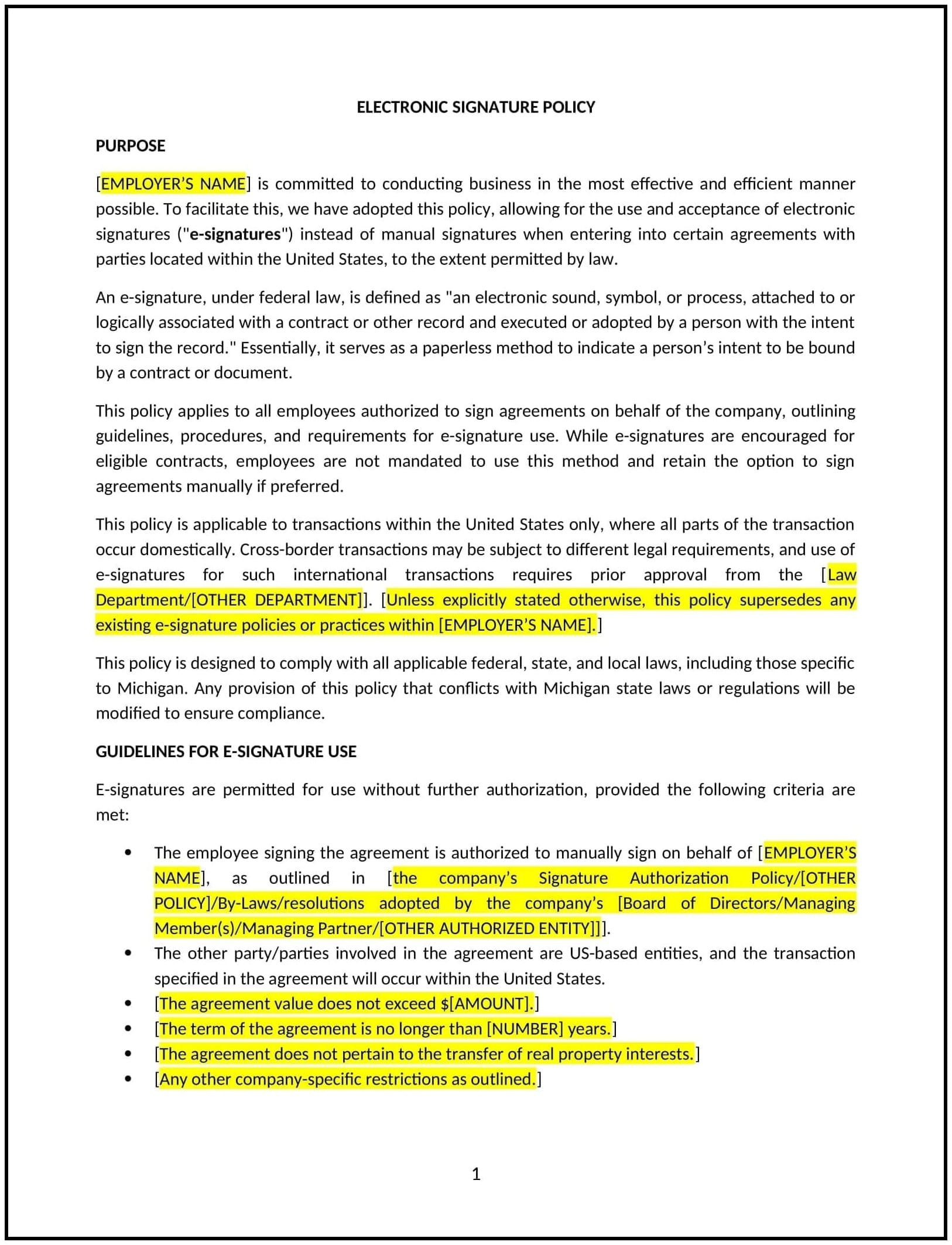Electronic signature policy (Michigan): Free template
Got contracts to review? While you're here for policies, let Cobrief make contract review effortless—start your free review now.

Customize this template for free
Electronic signature policy (Michigan)
An electronic signature policy provides Michigan businesses with guidelines for using electronic signatures in lieu of handwritten signatures to authorize documents, agreements, and contracts. This policy ensures that electronic signatures are legally valid, secure, and used in a consistent and compliant manner across the organization.
By adopting this policy, businesses can streamline document management, reduce reliance on paper-based processes, and support compliance with Michigan state laws and federal regulations governing electronic transactions.
How to use this electronic signature policy (Michigan)
- Define acceptable use of electronic signatures: Clearly outline the types of documents and agreements that can be signed electronically, such as contracts, employee agreements, and consent forms. Specify any exceptions, such as documents requiring notarization or government filings.
- Establish security protocols: Outline security measures to ensure that electronic signatures are obtained and stored securely, such as the use of encryption, multi-factor authentication, and secure document management systems.
- Ensure legal compliance: Reference the Electronic Signatures in Global and National Commerce (ESIGN) Act and Michigan’s Uniform Electronic Transactions Act (UETA) to ensure that electronic signatures are legally recognized and enforceable.
- Set approval procedures: Define the process for approving and validating electronic signatures, including who can sign on behalf of the business and how to verify the authenticity of the signature.
- Address storage and retention: Specify how electronically signed documents will be stored, including the format and duration of retention, and ensure that they are accessible for auditing or future reference.
- Provide guidelines for disputes: Set procedures for addressing any disputes or challenges related to electronic signatures, including how to verify their validity and resolve issues.
- Maintain confidentiality: Ensure that the electronic signature process respects privacy laws and protects sensitive information, particularly for documents containing personal or confidential details.
Benefits of using this electronic signature policy (Michigan)
This policy provides several key benefits for Michigan businesses:
- Increases efficiency: By using electronic signatures, businesses can eliminate delays caused by manual signatures, streamline document workflows, and accelerate approval processes.
- Reduces paper usage: Switching to electronic signatures reduces the need for physical documents, saving money on paper, ink, and storage while also benefiting the environment.
- Ensures compliance: The policy ensures that electronic signatures are used in compliance with Michigan laws, federal regulations, and industry standards, providing legal assurance that documents are valid.
- Enhances security: Electronic signatures, when properly managed, provide a secure method of signing documents that reduces the risk of fraud or unauthorized alterations.
- Promotes convenience: Employees, clients, and partners can sign documents from anywhere, at any time, enhancing flexibility and facilitating remote work.
Tips for using this electronic signature policy (Michigan)
- Communicate the policy: Ensure that all employees, contractors, and partners understand the electronic signature policy and how to use it properly by including it in the employee handbook and during onboarding.
- Implement robust security measures: Ensure that electronic signatures are protected by strong authentication, encryption, and secure document management systems to prevent unauthorized access or fraud.
- Regularly monitor compliance: Conduct periodic audits to ensure that electronic signatures are being used properly, and that all signed documents are stored securely and in compliance with the policy.
- Train employees: Provide training for employees on how to handle electronic signatures and ensure they understand when and how to use them correctly.
- Review periodically: Regularly review the policy to ensure it remains up to date with Michigan laws, industry best practices, and technological advancements in electronic signature technology.